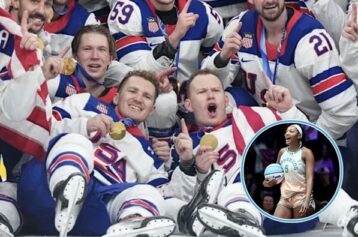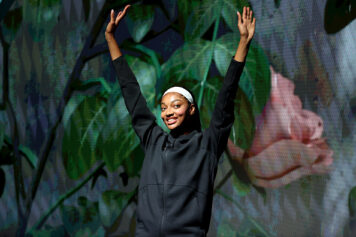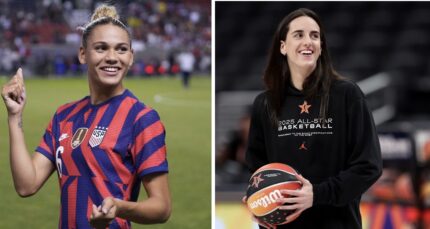With the Cavaliers poised for their first Final Four appearance since 1984, Carla Williams is proving to be one of the country’s best ADs.
In The Shadow League’s latest series, The Climb, we highlight remarkable individuals on the business side of the games we love who are just as important as the athletes who play them.
Today’s feature shines a light on University of Virginia Athletic Director Carla Williams.
***
Growing up in the foothills of the Georgia Piedmont in the town of LaGrange, Carla Williams was immersed in sports for as long as she can remember.
Whatever sport was in session, she was outside playing with her friends and cousins.
“Everyone in the neighborhood was always playing something, and we grew up about 100 yards away from the local rec center,” said Williams. “LaGrange was ‘Small Town USA’ and it was a sports town. So athletics was always a big part of my life growing up.”
Both of her parents came from humble beginnings, and the family fabric was very strong and informative from her earliest days. They didn’t have much in the form of material wealth or possessions, but there was an abundance of love and values that made everything else seem insignificant in comparison.
Her father, Barner (“A good country name,” she says), was the youngest of 19 children. His parents were married on the front porch of a house that her grandfather and his brothers built. They took their nuptials in 1910 and the first baby was born in 1912. Barner came along in 1934. He was a hard-working janitor who got his G.E.D. during the day.
“My father was a brilliant historian,” said Williams. “He loved history and I learned a lot listening to him talk about world history, American history and war history. He had such a great personality and was a gifted storyteller. He was gregarious and would keep everyone laughing.”
Johnnie Mae (“Another good country name,” she says), her mom, was the only girl among five brothers. She was an outstanding cook who was great with numbers. She worked a string of minimum wage jobs up until Carla was a teenager, when she got a job as a bank teller.
“We had a very big, close-knit family that was faith-oriented,” said Williams. “Church and Sunday School was a big part of our lives. My parents were very loving, caring, hard-working people. We didn’t have much, but we had plenty to eat. My mom made sure that we were always clean and that we looked nice. We always knew that our parents loved us. If we didn’t have anything else, we had that.”
By the time she reached middle school, Williams graduated from the neighborhood sandlot games — where the boys insisted that she play quarterback and running back in intensely competitive football games — to playing organized sports.
She was good at softball, but it was apparent that she was gifted on the hardwood.
By her sophomore year at LaGrange High School, the crafty point guard was playing for the top AAU program in Atlanta, The Georgia Metros. With her parents unable to get her back and forth to practice due to their work schedules, the team’s coaches would drive over two hours, round-trip, to pick her up and drop her off.
“That exposed me to the sport and the larger world outside of LaGrange,” she said. “That’s where the college coaches first saw me. I played for a really good high school program, but traveling nationally helped me get more exposure.”
She knew that she was a good player, but one experience at an elite summer camp in Maryland made her believe that her basketball skills could possibly take her places she once could’ve never fathomed.
“My parents couldn’t afford to send me to that camp,” said Williams. “But luckily, one of my teachers and their family were going to visit some of their family members in Maryland at the same time. So I rode in the car with them. They dropped me off at the camp, I was there for a week, and I piled back in the car with them for the ride back to Georgia when the camp was over.”
“There were a lot of great players at that camp, and I did really well,” she continued. “I started thinking that this could really be something special for me.”
Those feelings intensified as she traveled with the Metros to national tournaments in places like New Mexico, Pittsburgh, Tennessee and all across Florida and Georgia, winning a national AAU championship in the process.
On the prep level, she led LaGrange to two Class AAAA state titles. With All-Region and All-State accolades in hand, she was named the most valuable player of the 1985 Georgia All-Star game, which was played on the court in Athens where she’d later star in college.
Williams didn’t merely enjoy playing basketball. She watched and studied the game as if her very survival depended on it.
Late at night, she could be found watching the NBA Finals games that were airing on tape delay. As a point guard, she giddily watched old black and white films of Bob Cousy working the Boston Garden into a frenzy.
She couldn’t satiate her appetite for looking at players that had a unique command of the game, whose passing, dribbling and intelligence enthralled her. Magic Johnson and Michael Jordan were among her favorites when she was in high school.
On the court, she was known as a hustler, a great passer and facilitator. She could score when needed, but the purest joy she received was in playing defense and setting her teammates up as the consummate floor general.
She accepted a scholarship to the University of Georgia, one of the top women’s basketball programs at the time. Despite her accomplishments and talent, there were small seeds of doubt as she prepared to head off to college.
Could she handle the academics? Could she compete at the highest level? These were some of the questions that ran through her mind.
“As a senior in high school, I was very good but I wasn’t the best player in the state,” said Williams.
Georgia’s head coach, Andy Landers, when he came to LaGrange to recruit her, told Williams, “You’re not gonna play your first year and you probably won’t play as a sophomore either. By your third year, you’ll get into some games.”
Williams proved Landers wrong when she earned a starting job in the backcourt during her sophomore season.
Her first year on campus was not an easy one.
“Learning how to be a successful student and an integral part of the team was very stressful for me as a freshman,” she said. “I was a good student in high school, but hadn’t taken any college prep classes. I wasn’t necessarily prepared for the academic rigor. It took me about a year to figure it out.”
As a sophomore, everything fell into place, both athletically and academically.
At Georgia, she played with five-time Olympian Teresa Edwards and two-time Olympian Katrina McClain and was among the top 10 scoring leaders in school history when she graduated in 1989.
She asked coach Landers why he once offered her a scholarship over other players that were ranked higher. He told her, “You have all the intangibles that we need for our program.”
That planted a seed in terms of thinking about the best way, to build not only teams, but larger organizations.
“We went to the Sweet 16 during my last three years and it was such a treat to be able to play with teammates who were so talented,” said Williams. “And I loved being on a college campus, which exposed me to a whole new world.”
After college, she briefly played pro ball in Spain, but didn’t enjoy being so far from her friends and family.
She returned to Athens for grad school in public administration and Landers quickly offered her a job as an assistant coach. In grad school, she met the man who would later become her husband.
Wanting to stay involved in sports, she enjoyed her time as an assistant coach. During her time on the bench, she was a critical part of bringing in top-ranked recruiting classes and helping the Lady Bulldogs advance to consecutive Final Fours in 1995 and 1996 and the ’96 national championship game against Tennessee.
Leaning on her sociology major as an undergrad, coupled with her master’s program and experiences as a coach, her inner voice informed her that working in sports administration was the way to go.
“I had a flashback to be being a freshman in high school and seeing the college coaches walk in with their logos on their shirts, and I remember being fascinated that they were offering these great scholarship opportunities to young people” said Williams. “I had been a student-athlete and a college coach, and working in sports administration would allow me to use experiences to benefit others. Going to college opened so many doors for me, and not just for me, but for generations after me.”
Williams fell in love with working on a college campus in higher education. She’d always enjoyed sports and working with young people, so pursuing sports administration as a profession allowed her to follow her passion.
After five years in coaching, her husband finished his PhD and got his first job as a faculty member at Florida State teaching public policy. She took a pay cut to work an entry level position in the student services office at Florida State and also volunteered in many different capacities within the athletic department, while at the same time pursuing her own PhD.
Three years later, she took a position at Vanderbilt as an Associate Athletic Director. After four years in Nashville, she returned to the University of Georgia, where she worked for 13 years as their Associate A.D.
Williams was always focused on doing the best job possible at each of her stops. She wanted to be the best assistant coach in the country, then the best Associate A.D.
Ten years ago, as she kept advancing and assuming more responsibility in Georgia’s athletic department, she began thinking about what the future held.
“I made a list of schools that I wanted to be an Athletic Director at, and the University of Virginia was on that list,” she said. “It was an academically elite institution that had done well athletically in a great conference. And it was in the region that my family wanted to stay in. There was always an attraction to UVA. When the position came open, this was an opportunity where everything seemed to fall into place.”
After three rounds of an intense interview process, Williams got the job in late October of 2017, becoming the first African-American female Athletic Director at a Power 5 school.
“The University of Virginia is excited to welcome Carla Williams to lead our athletics department,” university President Teresa A. Sullivan said upon making the announcement. “Her experience as a successful student-athlete, coach and senior administrator at the highest levels of Division I athletics is impressive. Equally impressive is her commitment to education and the academic pursuits of student-athletes. Carla will also be a dynamic contributor to the University and Charlottesville communities.”
“It’s so unique and rare for someone like me to be in a position like this,” said Williams. “I think about my grandparents, parents, great-grandparents and all of my family members, and am just so thankful for this opportunity. I want to make sure that I take full advantage and do the best that I can, so others will have similar opportunities.”
When she looks out of her window onto the beautiful campus grounds in Charlottesville, or when she stops in to watch some of the teams practice, she gets energized and inspired by seeing the Cavaliers student-athletes working hard in pursuit of their dreams.
“To play a role in that is extremely meaningful to me,” she said.
It takes on even more meaning when she reflects back on her days as a college athlete, and the myriad of individuals who took the time to help her along in her professional journey.
“There were so many people that were willing to mentor me, to be role models, to share their experiences and help me along the way,” said Williams. “It’s so important for young people to be encouraged, to know that they can do it and be exposed to the skills needed to do it well and achieve at the highest levels.”
For a young girl from LaGrange, she’s climbed a very high mountain to get where she is.
And in the process, she’s inspired countless others to dream big, and to believe in the beauty of those dreams along the way.



